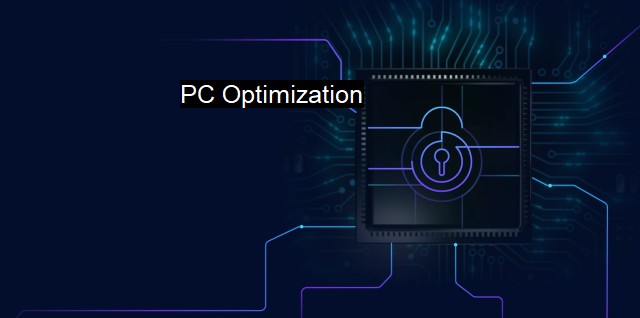What is PC Optimization?
Improving Cybersecurity through PC Optimization: Techniques to Enhance Performance, Reliability, and Security Posture
PC optimization generally refers to the collective processes and tools used to boost the computer's performance, maintain its proper function, and protect its privacy and data. Today, it encompasses cybersecurity measures and antivirus applications that heighten its aptness for safeguarding the device from malware, attacks, and data breaches.In more tangible terms, PC optimization typically involves the deletion of unnecessary and junk files, management of startup processes, and software updates. this is crucial, as keeping software and operating systems updated ensures that the system has access to the most recent protection settings and functionalities meant to steer off hackers.
Viruses and malware are notorious for slowing down PC performance due to their system-encrypting operations. Hence, virus and malware protection is viewed as an integral aspect of PC optimization. An antivirus program on a computer constitutes its first line of defense against malicious software. These run automatic scans to identify and eliminate potential threats, hence ensuring a smooth and optimized computer performance.
The continually updated virus databases that these antivirus programs come with can effectively recognize millions of malware types, keeping the PC secure and efficient at all times. From the simplest adware to the most complex ransomware, the viruses are detected and isolated for disposal. Consequently, they preempt the slowing down of PC operations by eliminating potential threats instantaneously and automatically.
Some antivirus programs also come with an additional PC optimization feature. These functionalities clear out temporary files, resolve errors in the system registry, manage the background operations, and defragment the hard disk. Therefore, they not only boost system performance but also enhance security by removing potential points from where attacks could depart.
Cybersecurity-related PC optimization involves the encryption of data, boosting the PC's credentials, and using protective firewalls. Data encryption is particularly important in safeguarding sensitive and personal data while transmitting over the internet. Credential-strengthening refers to strategies like frequent change of passwords, using two-factor authentication, and avoiding easily guessable passwords. Firewalls act as protective walls against unauthorized access.
As the digital world continues to turn, the need for PC optimization grows incessantly important. With the number of cyber threats growing by the day, having a well-optimized computer ensures intimate data protection and smoother functionality. Because, remember, an optimized system is not just fast, but one that provides privacy and protection.
Notably, since most PC operations nowadays are windows-based, the push for total cybersecurity requires optimizing these types of applications and platforms. The updating of windows function allows for detection and patching up of any security loopholes, hence cutting off any chances of forced entries by malicious software. Hence, updates must not be ignored since they are part and parcel of the PC optimization process, especially towards cybersecurity.
PC optimization involves more than just speed augmentation and smooth functionality. where cyber threats are near ubiquitous, optimization transcends to cover cybersecurity and use of antivirus programs. Attackers are always upgrading their intrusive software, and as such, countermeasures must progress equivalently. Ensuring that your computer is optimized is according a step in the right direction towards maintaining superior performance and baiting the frequently mutating and attacking malware. Against all odds in the digital world, PC optimization puts your computer's best defense foot forward garage.

PC Optimization FAQs
What is PC optimization in the context of cybersecurity and antivirus?
PC optimization in the context of cybersecurity and antivirus refers to the process of configuring your computer's settings and removing unnecessary files, programs, and registry entries to enhance its performance, reliability, and security. It involves implementing various security measures and antivirus software to protect the computer from malware, viruses, and other cyber threats.Why is PC optimization important for cybersecurity and antivirus?
PC optimization is crucial for cybersecurity and antivirus because it helps to eliminate vulnerabilities that cybercriminals can exploit to gain unauthorized access to your computer's data or install malicious software. A well-optimized computer also runs faster and more efficiently, which improves its ability to detect and eliminate malware and viruses.What are some common techniques for optimizing a PC for cybersecurity and antivirus?
Some common techniques for optimizing a PC for cybersecurity and antivirus include installing reliable antivirus software, keeping the operating system and other software up-to-date, removing unnecessary files and programs, disabling unwanted startup programs, configuring security settings, and running regular malware scans.Can I optimize my PC for cybersecurity and antivirus on my own, or do I need to hire a professional?
You can optimize your PC for cybersecurity and antivirus on your own, but it's essential to have a basic understanding of computer security and optimization techniques. If you're not confident in your abilities, or if you have a more complex network, you may want to hire a professional to help you optimize your computer's security and performance. A professional will be able to assess your computer's specific needs and recommend the most effective optimization strategies for your situation.| | A | | | B | | | C | | | D | | | E | | | F | | | G | | | H | | | I | | | J | | | K | | | L | | | M | |
| | N | | | O | | | P | | | Q | | | R | | | S | | | T | | | U | | | V | | | W | | | X | | | Y | | | Z | |
| | 1 | | | 2 | | | 3 | | | 4 | | | 7 | | | 8 | | |||||||